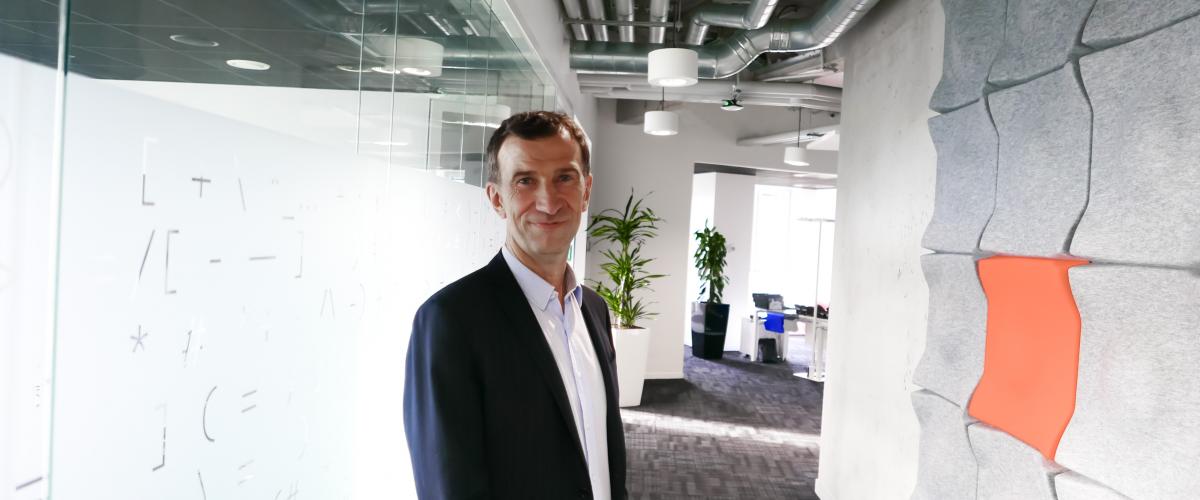b<>com celebrated its 5th birthday a few weeks ago. We took this opportunity to catch up with Vincent Marcatté, President of b<>com and of the association FIT, which brings together the eight Institutes of Research and Technology at the national level.
How would you sum up the first five years of b<>com?
5 years after launching b<>com, we have the same passion and energy that we did at the start, but now we can stand on our achievements as well. Over these past five years, we have been guided by three factors, which are business impact for our industrial members, contribution to academic excellence, and international visibility.
What does b<>com look like today?
Today, the IRT b<>com stands for Innovation that is Real and Transferable. Since 2012, 40 technologies have been transfered, and we have published more than 200 scientific papers.
The IRT b<>com, also stands for Immediate Results and Tangibility, with the desire to be more agile in addressing the needs of our SME members. We have been able to demonstrate the added value of an integrated multi-partner team, going from a doctoral student's idea to our first product in just 9 months, one which is now sold by several members and an outside company.
It also standards for the International Reach of its Teamwork, with commitments to 10 European projects, involvement in 18 standardization bodies and open-source or industrial alliances, our first award at the NAB Show in Las Vegas last April, and the launch of a Europe-wide ETSI initiative with leading players like Fraunhofer, the CEA, Bosch, and Deutsche Telekom, to name just a few.
Finally, we are Individuals Radically Transformed: b<>com now has 250 employees, including 25 doctoral students. Diversity and inclusion have been fundamental values since the start of the adventure, and we now have 14 nationalities among our teams. Last of all, what the last five years show is our pride in having made b<>com a success, in creating this shared home. When I close my eyes, I see the smiles of the men and women who help this great adventure thrive each day, and to me, that is the greatest reward of all.
What are you most satisfied with?
Creating and developing such a structure to make it what it is today has not been easy, and I would like to thank the teams at b<>com, starting with the management team, for all of their commitment. These are the "b<>comers", both our own employees and those assigned to work here. When people tell us in international meetings that "Brittany is back", that's obviously very satisfying. That's what we were looking for: making a difference and being recognized for this ability to accelerate innovation on the national and international level.
We can also mention our partnership with Télécom Evolution, a subsidiary of IMT, although we have had trouble making a difference when it comes to training. They have trusted us to redefine training in the field of Hypermedia: a real success that will lead to further ones down the road, and our contribution to the Digital Transformer program at Université Rennes 1 is along the same lines. This skills approach is key because the human factor is central to our concerns, and this country needs people who are experts in high-tech subjects while also being able to work in multi-disciplinary, multi-cultural teams that are diverse and inclusive.
What challenges lie in the years ahead?
We must continue to be ambitious, and our goal is to become a global leader in our fields. We'll also be able to say that we are starting to succeed when major international players come to seek us out.
We must also strengthen the shared home with increased participation by engineers and researchers from both the private sector and academia, who should identify b<>com as a way to do good research and create value for their career path.
We'd like to go from 250 people today to 400 by 2025, with steady but necessary growth to make ourselves a global name. Our goal is also to have good stories to tell, like future b<>com spin-offs. They will become business successes by relying on the excellence of the projects' results and the guidance that we offer them, with positive feedback for their founders, the region, and the foundation. Multiple spin-off projects are currently in an emergent phase.
We also just created b<>com licensing, our monetization subsidiary, and in this too, we aim to have significant commercial success for our shareholders as well as for outside clients, and certainly future investors. Finally, we'd like to spearhead the creation of innovation campuses that would help develop excellence and streamline training, research, and innovation wherever b<>com is present.
And nationally?
Unfortunately, many obstacles remain. Europe and France still suffer from excessive risk aversion, and bureaucracy is still a huge factor. This has prevented us from going as fast and far as we would like, and from being able to play on a level field with our global competitors. I do hope that our results will lead our stakeholders to place even greater trust in our future, and to make the IRT financially sustainable with a model that relies on 1/3 public funds, 1/3 private funds, and 1/3 competitive financing, local governments, and intellectual property monetization by 2025, as suggested by FIT (French Institutes of Technology).



